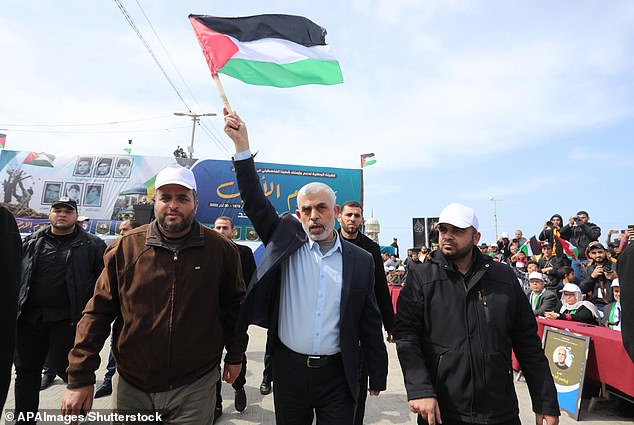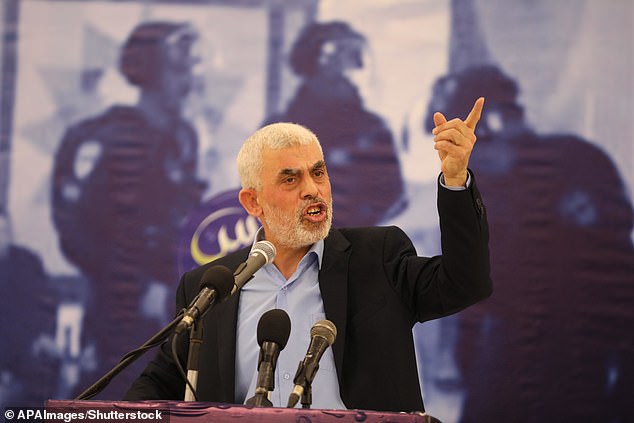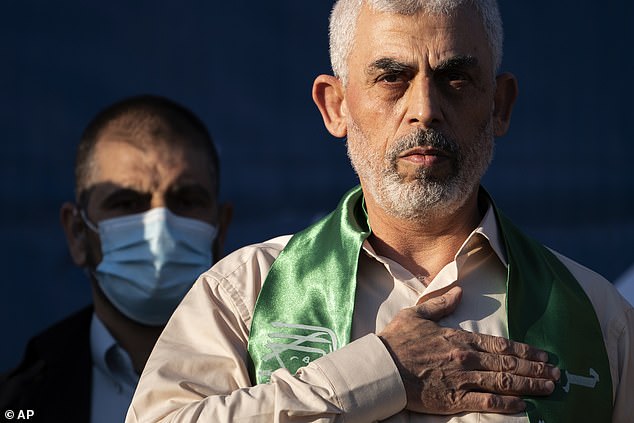Israel has sent a ruthless message to its enemies in the Middle East: we always get our man. And this time it was the highest-ranking Hamas terrorist of all.
Yahya Sinwar, who was killed yesterday by tank fire, was the depraved mastermind behind the October 7 attacks last year in which 1,200 Israelis were murdered in the most barbaric manner imaginable and more than 250 were taken hostage.
He not only wanted to kill Israelis but also the very idea of peace.
Sinwar’s death is delayed justice for terrible crimes. As UK Defense Secretary John Healey said: “I, for one, will not mourn the death,” nor will any mainstream politician in the West.
The man was a monster, personally responsible for plunging the Gaza Strip into decades of misery.
He founded Hamas’ security service, Majd, in the late 1980s and oversaw the hunt for suspected Israeli collaborators. Those accused of cooperating with the Jewish state were shot, hanged or tortured.
Yahya Sinwar, who was killed yesterday by tank fire, was the depraved mastermind behind the October 7 attacks last year in which 1,200 Israelis were murdered in the most barbaric manner imaginable and more than 250 were taken hostage, writes Mark Almond.
Since Israel’s large-scale invasion of Gaza last year, he has been Hamas’ top military commander in the war zone. Political leader Ismail Haniyeh was widely seen as the overall head of Hamas until his assassination in Tehran last July, but Haniyeh had no direct control over the terrorist foot soldiers.
Sinwar spent much of his life in Israeli prisons, serving four concurrent life sentences following his arrest in 1988. But he was freed in 2011 as part of a prisoner swap, in which more than 1,000 Palestinians were freed in exchange for a single Israeli soldier, Gilad. Shalit.
Since then, he is believed to have spent much of his life underground in Hamas’ tunnel network. One of these tunnels is believed to have led to a UN-operated school in Gaza, which is used as a refugee center. It was also a rallying point for Hamas terrorists, who used homeless civilians as human shields.

The death of Sinwar, who was Hamas’ top military commander in the Middle East war zone, is belated justice for his terrible crimes, says Mark Almond.

The systematic assassination of Hamas leaders sends a chilling message to their paymasters in Iran that no political or military leader is safe.
Israel has repeatedly demonstrated in recent weeks that its intelligence services have infiltrated every aspect of its enemies’ power structure. Their communication systems have been compromised in multiple ways, with explosives placed on pagers and walkie-talkies, while no mobile phone can be considered safe.
But while Israel’s beheading of key enemies such as Hezbollah’s Hassan Nasrallah and Hamas’s Ismail Haniyeh relied on their unique intelligence-gathering skills, Sinwar’s death at the hands of a tank commander was the result of an encounter casual. He fired at a group of terrorists from close range without knowing that Sinwar was among them.
The systematic murder of Hamas leaders sends a chilling message to their paymasters in Iran and to any Arab country that may be tempted to support the Palestinians. No political or military leader is safe.
Ayatollah Khamenei in Tehran and also Iran’s president, Masoud Pezeshkian, would do well not to launch a war against Israel, not only for fear of provoking the United States into the conflict on Israel’s side, but because they could be signing their own death sentences.
The mass beheading of terrorist commanders is proving to be a very successful strategy. There are still thousands of guerrillas, heavily armed and now shouting for revenge, but they lack effective coordination.
In Lebanon, no new wave of leaders has emerged to replace those killed or maimed in the pager attacks. And in the Gaza Strip there is no obvious replacement for Sinwar. His death will not signal an immediate end to the fighting.
Instead, the Hamas militia will do what Hezbollah’s foot soldiers have done: continue fighting without any plan. Both armies have a death cult mentality and many will be determined to continue until they are killed or run out of ammunition.
Only one thing is certain: another Yahya Sinwar is likely to emerge. The man killed yesterday was born in the Khan Younis refugee camp in 1962 and was orphaned as a child when his parents were killed in an Israeli attack.
His life became a long exercise in revenge. At worst, his legacy will be a cult of revenge among today’s orphans. We have to hope that the manner of his death does something to counteract that.
Mark Almond is director of the Crisis Research Institute in Oxford.


